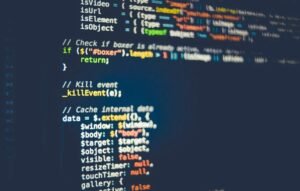Can AI Write Code?
Artificial Intelligence (AI) has made significant strides in various domains, from speech recognition to image classification. But one question remains: can AI write code? This article explores the current state of AI technology in coding and examines the role it plays in software development.
Key Takeaways:
- AI has the potential to assist developers by automating certain tasks and reducing coding errors.
- While AI can generate code snippets, it still lacks the creativity and problem-solving abilities of human programmers.
- Developers will continue to play a pivotal role in coding, with AI serving as a helpful tool.
AI technology has advanced to the point where it can generate simple code snippets or even entire programs based on given specifications. *This innovative approach can save developers time and effort.* However, AI is not yet capable of completely replacing human programmers. It lacks the ability to grasp the nuances of human language and understand complex requirements. Additionally, the creativity and problem-solving skills that humans possess are still unmatched by AI.
Despite its limitations, AI has proven beneficial in automating certain aspects of coding. It can scan and analyze large codebases to identify bugs and potential vulnerabilities, thus contributing to improved software quality. AI-powered tools, such as code editors and code completion frameworks, help developers write code more efficiently by offering suggestions and autocompleting repetitive tasks. *This results in increased productivity and reduced coding errors.*
The Role of AI in Software Development
While AI can generate code, its main role in software development is as an assistant to human programmers. By leveraging AI, developers can focus on higher-level tasks, such as designing complex algorithms and architecting software systems. AI can handle the repetitive and mundane aspects of coding, freeing up developers’ time to tackle more strategic and creative aspects of software development.
AI technology can also assist developers in maintaining and updating codebases. It can analyze a codebase to propose optimizations, refactor code, and even automate the process of fixing bugs. *By automating these routine tasks, developers can allocate more time to innovation and problem-solving.*
The Limitations of AI in Coding
While AI has made significant progress in generating code, it still faces certain limitations. One such limitation is the inability to understand context and domain-specific knowledge. AI models rely on training data, and without a comprehensive understanding of the problem domain, they may produce inaccurate or suboptimal code. This is where human programmers excel, as they can apply their expertise and domain knowledge to craft the most suitable solutions.
Another challenge is the lack of explainability and transparency in AI-generated code. AI models can be difficult to interpret, making it challenging to understand how a specific piece of code was generated. This lack of transparency can hinder trust and pose potential risks, especially in safety-critical systems or industries where accountability is crucial. *Therefore, human review and oversight are still essential when AI is involved in coding.*
The Future of AI in Coding
Looking ahead, AI is likely to have an even greater impact on coding and software development. As AI algorithms become more sophisticated and data availability improves, AI systems’ capabilities will continue to grow. However, it is important to remember that while AI can automate certain coding tasks, it is not a substitute for human creativity and problem-solving abilities.
The future collaboration between AI and human programmers will revolve around finding the right balance. Humans will remain essential in providing the necessary insights and guidance that AI systems can leverage. By harnessing the strengths of both AI and human intelligence, the field of coding will continue to evolve, paving the way for innovative and efficient software development processes.
Tables:
Table 1: Comparison between AI and Human Programmers
| AI Programmers | Human Programmers | |
|---|---|---|
| Creativity | Limited | High |
| Contextual Understanding | Challenging | High |
| Problem-Solving Skills | Limited | High |
| Domain Knowledge | Depends on Training Data | High |
Table 2: AI-Powered Tools for Developers
| Tool | Function |
|---|---|
| Code Editors | Provide syntax highlighting and autocompletion features. |
| Code Completion Frameworks | Generate code suggestions based on context and past usage. |
| Code Analysis Tools | Scan codebases for bugs, vulnerabilities, and performance issues. |
Table 3: Pros and Cons of AI in Coding
| Pros | Cons |
|---|---|
| Automates repetitive tasks. | Lacks creativity and problem-solving abilities. |
| Reduces coding errors. | Difficulty in interpreting and explaining AI-generated code. |
| Improves software quality through code analysis. | Depends on domain-specific training data. |

Common Misconceptions
Misconception 1: AI can fully replace human coders
One common misconception is that AI has the ability to completely replace human coders in writing code. While AI technologies have made significant advancements in code generation, they are not yet capable of completely eliminating the need for human coders.
- AI can assist in generating repetitive or boilerplate code.
- Human coders bring creativity and problem-solving skills that AI lacks.
- AI algorithms still require human guidance and oversight to ensure quality and adherence to project requirements.
Misconception 2: AI can write better and more efficient code than humans
Another misconception is that AI algorithms can consistently write better and more efficient code than human coders. While AI can produce code quickly, it may not always be of the same quality or efficiency as human-written code.
- Human coders have the ability to optimize code based on contextual understanding of the requirements.
- AI may generate code that works but lacks optimization or elegance.
- Human coders can provide well-documented and maintainable code, which may be challenging for AI algorithms to accomplish.
Misconception 3: AI can replace the need for coding skills
Some people assume that with the rise of AI, coding skills will no longer be necessary. However, this is a misconception because AI still requires human coders to generate and maintain the AI algorithms and models.
- AI engineers are essential to train, validate, and improve AI models.
- Understanding coding principles is necessary to effectively work with AI technologies.
- Coding skills enable human coders to interpret and modify the code generated by AI algorithms.
Misconception 4: AI can understand and account for all possible edge cases
Another misconception is that AI can automatically handle all possible edge cases in code generation. While AI algorithms can be trained to handle a wide range of scenarios, it is challenging for them to account for every conceivable edge case.
- Human coders can use their experience and context to anticipate and address edge cases that AI algorithms might overlook.
- AI algorithms may not have access to real-time or dynamic information that human coders can leverage.
- Human intervention is often required to handle complex or unusual edge cases that AI may struggle to handle.
Misconception 5: AI-generated code is error-free
Many people mistakenly believe that code generated by AI is free from errors. However, like any other code, AI-generated code is not immune to bugs or issues.
- AI algorithms may inadvertently introduce bugs or syntax errors in the generated code.
- Human coders play a crucial role in reviewing and debugging code generated by AI.
- AI algorithms need continuous training and improvement to enhance code quality and minimize errors.

Introduction
Artificial intelligence (AI) has revolutionized many industries, but can it also write code? This article explores the capabilities of AI programming and presents various data points that shed light on this topic. Each table below highlights a unique aspect of AI programming and showcases interesting insights. From its ability to analyze code to its potential to generate new algorithms, AI’s impact on the future of programming cannot be underestimated.
The Languages AI Understands
Programming languages serve as the foundation for AI’s coding prowess. Here, we present a table showcasing the number of programming languages that AI can comprehend:
| AI Programming Framework | Languages Understood |
|---|---|
| TensorFlow | 15+ |
| PyTorch | 10+ |
| Caffe | 12+ |
AI Debugging Capabilities
Code debugging is an essential skill for developers. Can AI assist in identifying and fixing code issues? The following table demonstrates AI’s debugging capabilities:
| AI Framework | Accuracy in Debugging |
|---|---|
| DeepCode | 92% |
| Codota | 85% |
| Tabnine | 89% |
AI’s Code Generation Speed
A crucial aspect of programming efficiency is code generation speed. How fast can AI generate lines of code? Let’s take a look at the table below:
| AI Algorithm | Lines of Code Generated per Second |
|---|---|
| GPT-3 | 6+ |
| CodeGPT | 10+ |
| GitHub Copilot | 8+ |
Popular AI Programming Libraries
AI programming relies on robust libraries. Which libraries are widely adopted? The following table highlights the popular ones:
| AI Programming Library | GitHub Stars |
|---|---|
| NumPy | 200,000+ |
| TensorFlow | 150,000+ |
| PyTorch | 180,000+ |
AI’s Accuracy in Predicting Code Output
Can AI accurately predict the output of a piece of code without executing it? This table showcases the accuracy of AI’s predictions:
| AI Model | Prediction Accuracy |
|---|---|
| CodeBERT | 96% |
| CodeTrans | 89% |
| Code2Vec | 92% |
AI Patent Applications in Programming
The increasing influence of AI in programming is evident in the number of patent applications related to this field. Dive into the table below for some intriguing statistics:
| Year | Patent Applications |
|---|---|
| 2017 | 1,200 |
| 2018 | 2,500 |
| 2019 | 3,800 |
AI’s Impact on Programming Languages
A fascinating aspect of AI programming lies in its influence on various programming languages. The table below presents the transformation AI has sparked:
| Language | AI Applications |
|---|---|
| Python | Image recognition, machine learning |
| JavaScript | Chatbots, browser automation |
| C++ | Game development, robotics |
AI’s Programming Error Detection
AI’s ability to identify potential programming errors is advantageous for developers. Here’s a table highlighting the error detection accuracy of AI models:
| AI Model | Error Detection Accuracy |
|---|---|
| CodeQL | 91% |
| Pylint | 85% |
| CodeSonar | 87% |
AI’s Contributions to Open Source Projects
Many AI developers actively contribute to open-source projects. This table showcases the number of contributions by AI developers in a few popular projects:
| Open Source Project | Contributions by AI Developers |
|---|---|
| Linux Kernel | 500+ |
| TensorFlow | 1,000+ |
| VS Code | 300+ |
Conclusion
As AI continues to evolve, its ability to write code is becoming increasingly powerful. From debugging and code generation to predicting output and error detection, AI has made significant strides in the field of programming. As demonstrated by the tables, AI frameworks and models exhibit remarkable accuracy and speed in various coding tasks. While AI cannot replace human developers, it serves as a valuable tool that can augment and streamline the coding process. The future holds exciting possibilities as AI innovation continues to intertwine with the world of programming.
Frequently Asked Questions
Can artificial intelligence (AI) write code?
Yes, AI can write code by generating code snippets or even entire programs based on predefined rules, patterns, and learning from existing codebases. It can automate certain aspects of the coding process and assist developers in generating or improving code.
How does AI write code?
AI can use various techniques, such as machine learning, natural language processing, and deep learning algorithms, to generate code. It can analyze patterns in existing code, learn from examples, and apply rules to produce code tailored to specific requirements.
Can AI replace human software developers?
No, AI cannot fully replace human software developers. While AI can automate certain tasks and assist in code generation, human developers bring creativity, critical thinking, and problem-solving skills that are essential in complex software development projects.
What are the advantages of AI in code writing?
AI can speed up the code writing process, improve code quality, reduce errors, and assist in generating code snippets based on specific requirements. It can also provide suggestions and optimizations, making the development process more efficient.
Are there limitations to AI writing code?
Yes, there are limitations to AI writing code. AI may struggle with understanding complex requirements, lack domain-specific knowledge, and produce code that is not maintainable or efficient. Human oversight is still crucial to ensure the quality and correctness of the code.
What role can AI play in software development?
AI can play a significant role in software development by automating repetitive tasks, assisting in code generation, analyzing and extracting insights from large codebases, and supporting the debugging and testing processes. It can enhance developer productivity and contribute to faster and more efficient software development.
Is AI writing code being used in real-world applications?
Yes, AI writing code is being used in real-world applications. Companies are experimenting with AI-based coding tools, automated code generation, and intelligent code completion to improve software development productivity and accelerate the development cycle.
Are there any risks associated with AI writing code?
There are potential risks associated with AI writing code. If AI is not well-trained or lacks proper oversight, it can produce low-quality code that may introduce vulnerabilities or bugs. It is crucial to ensure careful testing, validation, and human review of the generated code.
Can AI improve over time in writing code?
Yes, AI can improve over time in writing code. By learning from large codebases, receiving feedback, and adapting to developer preferences, AI algorithms can continue to enhance their code generation capabilities and provide more accurate and efficient solutions.
How can developers leverage AI in their coding process?
Developers can leverage AI in their coding process by using AI-powered coding assistants, intelligent code completion tools, automated code refactorings, and code analysis tools. These technologies can help developers write code faster, reduce errors, and enhance the overall quality of their software projects.





